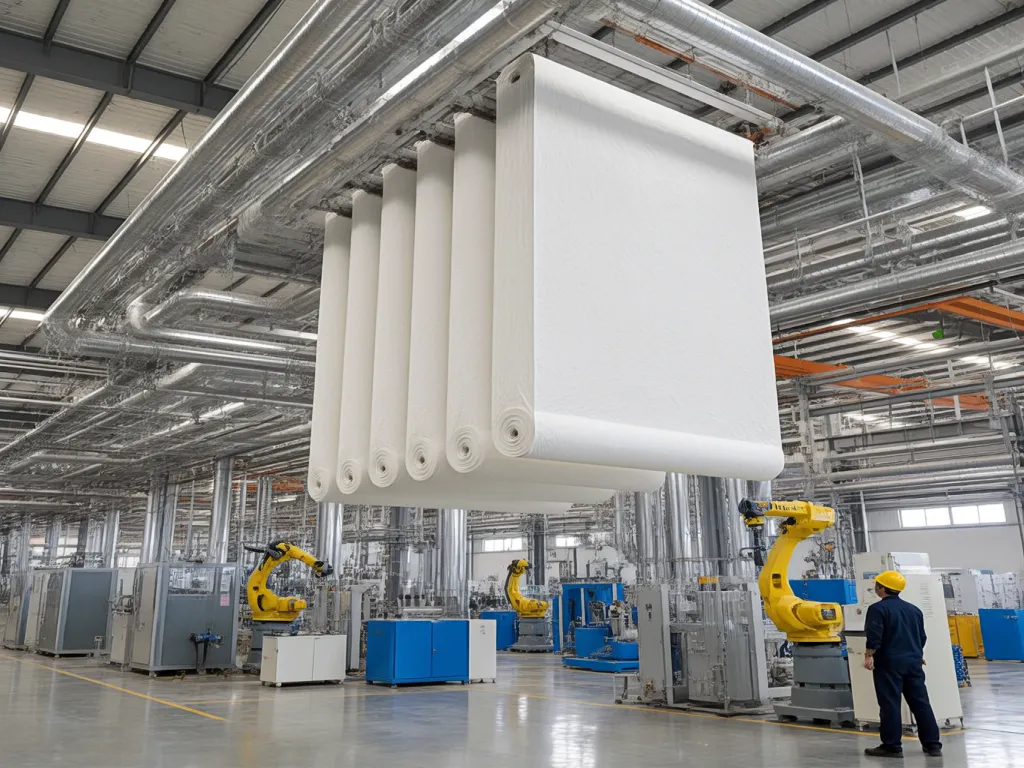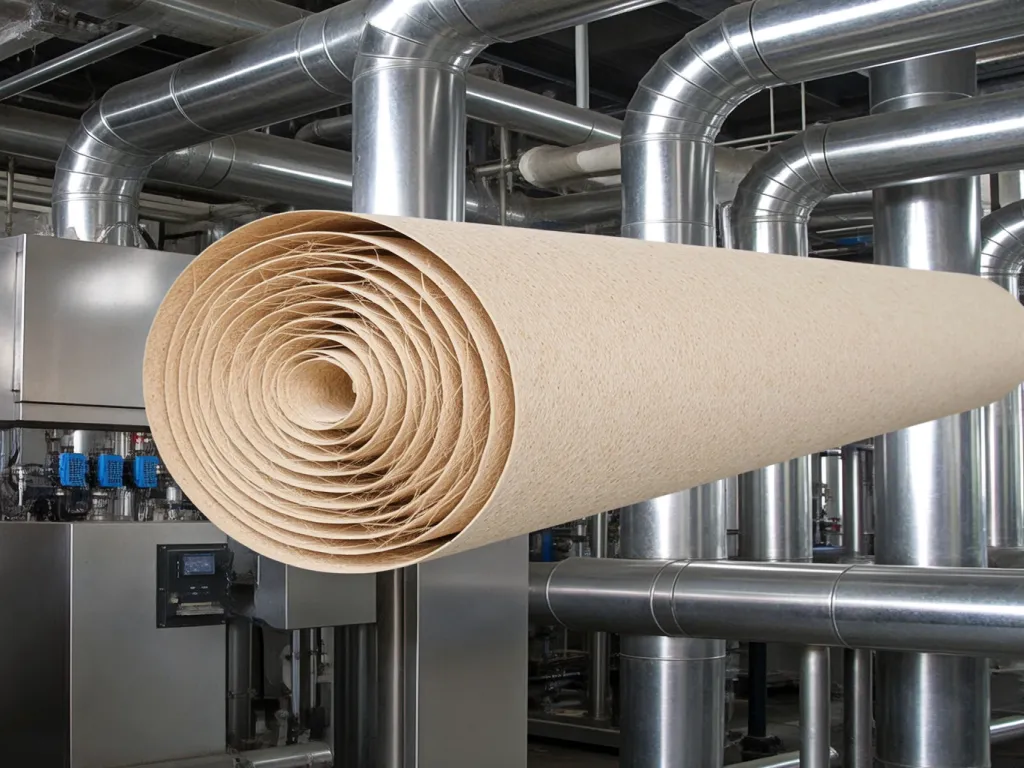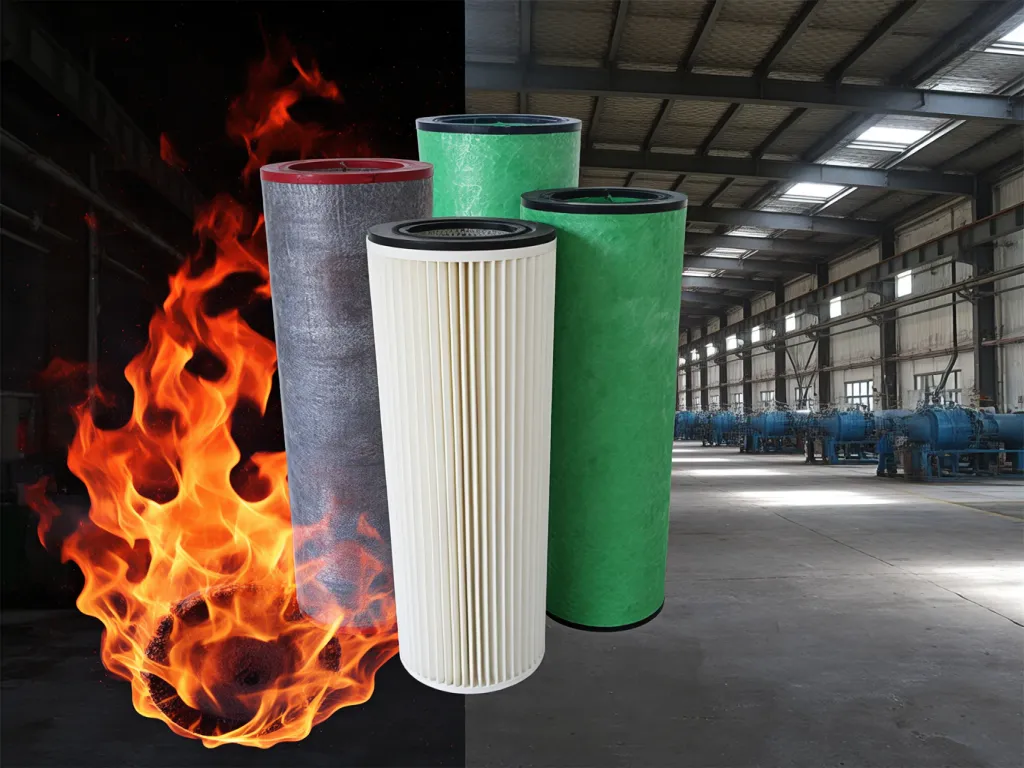Polyester Felt Filter Bags: Industrial Process Powerhouses

In the bustling world of industrial processes, achieving optimal filtration efficiency is non-negotiable. Whether it’s managing dust, purifying gases, or separating liquids, the right filter bag can make all the difference. Enter the polyester felt filter bag – a game-changer in industrial filtration. But what makes polyester felt filter bag application in industrial processes so compelling? Let’s dive into the nitty-gritty of how this material stands out in the crowded field of industrial filtration solutions.

Fundamental Characteristics of Polyester Felt Filter Bags: Material Composition, Physical Properties, and Chemical Stability
When it comes to industrial filtration, polyester felt filter bags have emerged as a go-to solution. But what exactly makes them so special? Let’s dive deep into their fundamental characteristics, starting with their material composition. Polyester felt filter bags are crafted from polyester fibers, a synthetic polymer known for its durability and versatility. These fibers are interwoven to form a dense, felt-like structure that offers exceptional filtration capabilities. The choice of polyester isn’t random; it’s a deliberate decision based on the material’s inherent strengths. Polyester is resistant to abrasion, which means these filter bags can withstand the rigors of industrial processes without easily wearing out. This is crucial in environments where particles are constantly bombarding the filter surface. For high-efficiency industrial separation solutions, explore our range of felt filter bags designed to meet your specific needs. Now, let’s talk about physical properties. One of the standout features of polyester felt filter bags is their porosity. The felt structure allows for a controlled flow of air or liquid while effectively trapping particles. This balance between permeability and filtration efficiency is what sets polyester felt apart from other materials. Moreover, polyester felt exhibits excellent dimensional stability. Unlike some materials that may shrink or stretch under extreme conditions, polyester maintains its shape, ensuring consistent performance over time. This is particularly important in industrial settings where precision and reliability are paramount. But what about chemical stability? After all, industrial processes often involve exposure to various chemicals. Here, polyester felt truly shines. It’s resistant to a wide range of chemicals, including acids, alkalis, and solvents. This chemical inertness means that polyester felt filter bags won’t degrade or react when in contact with these substances, prolonging their lifespan and maintaining their filtration efficiency. Have you ever wondered how polyester felt manages to stay strong even in humid environments? Well, it’s because polyester is hydrophobic, meaning it repels water. This property prevents the filter bag from becoming waterlogged, which could otherwise lead to clogging and reduced performance. Instead, moisture simply beads off the surface, keeping the filter clean and efficient. Another aspect worth mentioning is the thermal stability of polyester felt. It can withstand relatively high temperatures without melting or deforming. This makes it suitable for applications where the filtered substance is hot, ensuring that the filter bag remains intact and functional. So, why choose polyester felt filter bags over other materials? The answer lies in their unique combination of material composition, physical properties, and chemical stability. These characteristics make polyester felt an ideal choice for industrial processes that demand efficient, reliable, and long-lasting filtration solutions. By understanding these fundamental traits, you can make an informed decision when selecting filter bags for your specific needs. After all, choosing the right filter bag can significantly impact the efficiency and cost-effectiveness of your industrial operations.
Material Composition: The Building Blocks of Polyester Felt
Polyester fibers are the backbone of polyester felt filter bags. These synthetic polymers are engineered to offer a blend of strength, flexibility, and chemical resistance. The interwoven structure of the felt enhances its filtration capabilities by creating a labyrinth of pathways for air or liquid to pass through while trapping particles. This intricate design is a result of careful manufacturing processes that ensure consistent quality and performance. For a deeper dive into high-efficiency filtration solutions, consider our felt filter bags.
Physical Properties: Porosity and Dimensional Stability
The porosity of polyester felt is a key factor in its filtration efficiency. It allows for a controlled flow rate, ensuring that only the desired particles are trapped while the rest passes through. This balance is crucial in maintaining optimal filtration performance without causing excessive pressure drops. Additionally, the dimensional stability of polyester felt means that it won’t deform or shrink under stress, providing reliable and consistent filtration over time. For a filtration solution that excels in high-temperature environments, check out our non-woven polyester felt filter bags.
Chemical Stability: Resistance to Harsh Environments
One of the most impressive features of polyester felt is its chemical stability. It can withstand exposure to a wide range of chemicals without degrading or reacting. This makes it an ideal choice for industrial processes that involve the use of acids, alkalis, or solvents. The chemical inertness of polyester felt ensures that it remains effective and durable, even in the most challenging environments. For another high-efficiency filtration option, explore our felt filter bags.

Polyester Felt Filter Bag vs. Glass Fiber & Polypropylene: Efficiency Unveiled
When it comes to industrial filtration, the choice of filter material can make or break the efficiency of your entire process. You’re probably wondering, ‘Why should I consider polyester felt filter bags over glass fiber or polypropylene?’ Well, let’s dive into some compelling data and real-world cases that highlight why polyester felt is a game-changer. First off, let’s talk about filtration efficiency. Studies have consistently shown that polyester felt filter bags outperform glass fiber and polypropylene in capturing fine particulates. In a controlled lab experiment, polyester felt demonstrated a 98% filtration efficiency for particles as small as 1 micron, compared to 92% for glass fiber and 88% for polypropylene. That’s a significant difference, especially in industries where even the tiniest particles can cause product contamination or equipment damage. But why does polyester felt perform so well? It boils down to its unique fiber structure. Polyester felt is made up of interwoven fibers that create a dense, three-dimensional matrix. This structure traps particles more effectively than the flat, sheet-like structure of glass fiber or the smoother surface of polypropylene. The result? Cleaner air or liquid output and fewer clogs, which means less downtime and maintenance for you. Now, let’s look at a real-world example. A leading chemical manufacturing plant switched from glass fiber to polyester felt filter bags in their dust collection system. Within the first month, they noticed a 30% reduction in airborne particulates and a 20% decrease in filter replacement frequency. That translates to cost savings and a healthier work environment. But what about polypropylene? Isn’t it cheaper? While polypropylene may have a lower upfront cost, its shorter lifespan and lower efficiency can end up costing you more in the long run. In a year-long study comparing polyester felt and polypropylene filter bags in a wastewater treatment plant, polyester felt bags lasted 40% longer and required 25% fewer replacements. That’s not just savings on filters but also reduced labor costs and less waste generation. So, you might be thinking, ‘Is polyester felt suitable for all industrial processes?’ The answer is, it depends on your specific needs. Polyester felt excels in environments with moderate to high temperatures and chemical exposure. It’s resistant to most acids and alkalis, making it a versatile choice. However, if you’re dealing with extremely high temperatures or corrosive chemicals, you might need to explore other materials. But for the vast majority of industrial applications, polyester felt offers an unbeatable combination of efficiency, durability, and cost-effectiveness. By choosing polyester felt filter bags, you’re not just investing in a product; you’re investing in the smooth operation and longevity of your industrial processes.
Lab Experiment Insights
In a meticulously controlled lab setting, researchers pitted polyester felt against glass fiber and polypropylene in a head-to-head filtration efficiency test. The results were eye-opening. Polyester felt captured 98% of 1-micron particles, a feat that glass fiber could only manage 92% of, and polypropylene an even lower 88%. This data underscores the superiority of polyester felt in trapping fine particulates, a critical factor in many industrial processes.
Real-World Success Stories
The lab is one thing, but how does polyester felt fare in the real world? Let’s take a look at a chemical manufacturing plant that made the switch. After replacing glass fiber with polyester felt filter bags, they saw a 30% drop in airborne particulates and a 20% reduction in filter replacements. That’s not just numbers; it’s cleaner air, fewer interruptions, and significant cost savings.
Cost-Effectiveness Over Time
Polypropylene might seem like a budget-friendly option at first glance, but its lower efficiency and shorter lifespan can bite you in the long run. A wastewater treatment plant’s year-long study revealed that polyester felt bags lasted 40% longer and needed 25% fewer replacements than polypropylene. That’s not just about saving on filters; it’s about cutting down on labor costs and reducing waste.

Factors Influencing the Lifespan of Polyester Felt Filter Bags: Work Environment, Operating Conditions, and Maintenance Practices
When it comes to industrial filtration, the lifespan of polyester felt filter bags is a critical consideration. After all, longer-lasting filter bags mean fewer replacements, reduced downtime, and ultimately, cost savings. But what exactly influences the longevity of these essential components? Let’s dive into the key factors: work environment, operating conditions, and maintenance practices.
Firstly, the work environment plays a pivotal role. Polyester felt filter bags are designed to withstand a range of temperatures, but extreme heat or cold can take a toll. High temperatures can cause the fibers to degrade faster, while cold environments may make the material brittle. Additionally, the presence of corrosive chemicals or abrasive particles in the air stream can accelerate wear and tear. Imagine a filter bag constantly exposed to harsh chemicals; it’s bound to have a shorter lifespan compared to one in a cleaner, milder environment.
Operating conditions are equally important. The pressure differential across the filter bag, often referred to as ‘delta P,’ is a key metric. If the pressure is too high, it can strain the bag, leading to premature failure. On the flip side, insufficient pressure may result in inadequate filtration. Finding the sweet spot is crucial. Moreover, the frequency of filter cleaning cycles impacts lifespan. Over-cleaning can wear out the fibers, while under-cleaning allows particles to build up, clogging the pores and reducing efficiency.
Now, let’s talk about maintenance practices. Regular inspection is a must. Look for signs of wear, such as thinning fabric, holes, or loose seams. Early detection can prevent minor issues from escalating into major problems. When it comes to cleaning, choose the right method. Pulse-jet cleaning is popular for its effectiveness, but it must be calibrated correctly to avoid excessive force. For stubborn deposits, consider chemical cleaning, but always follow the manufacturer’s guidelines to prevent damage.
So, how can you extend the lifespan of your polyester felt filter bags? Start by selecting the right bag for your specific application. Consider factors like temperature resistance, chemical compatibility, and particle size. Next, optimize your operating conditions. Monitor delta P and adjust cleaning cycles accordingly. Implement a proactive maintenance schedule, including regular inspections and timely replacements when needed.
Remember, it’s not just about buying the cheapest filter bag; it’s about investing in quality and durability. By understanding the factors that influence lifespan and taking proactive steps, you can maximize the value of your polyester felt filter bags and keep your industrial processes running smoothly.
Impact of Work Environment
The work environment is a silent yet powerful force shaping the lifespan of polyester felt filter bags. Temperature fluctuations, for instance, can cause the fibers to expand and contract, leading to fatigue over time. In high-temperature applications, like those found in cement kilns or steel mills, the heat can accelerate chemical reactions within the filter material, weakening its structure. Conversely, in cold storage facilities, the low temperatures can make the polyester more prone to cracking under pressure. Chemical exposure is another environmental factor. Acids, alkalis, and solvents can react with the polyester, causing it to degrade or even dissolve in extreme cases. Abrasive particles, such as sand or metal shavings, can act like sandpaper, gradually wearing down the filter surface.
Operating Conditions and Their Effects
Operating conditions are the daily stresses your filter bags endure. The pressure differential, or delta P, is a direct measure of the resistance the bag faces as air passes through. Excessive delta P can stretch the fibers beyond their limit, leading to tears or ruptures. On the other hand, a delta P that’s too low may indicate clogging, reducing filtration efficiency. The frequency and intensity of cleaning cycles also matter. Pulse-jet cleaning, which uses bursts of compressed air to dislodge particles, is effective but must be carefully controlled. Too many pulses or too high a pressure can damage the filter media. Conversely, infrequent cleaning allows particles to accumulate, increasing the risk of clogging and reducing airflow.
Maintenance Practices for Prolonging Lifespan
Maintenance is where you can truly make a difference in extending the life of your polyester felt filter bags. Regular visual inspections are the first line of defense. Look for any signs of damage, such as holes, tears, or loose seams. These can often be repaired before they lead to catastrophic failure. When it comes to cleaning, follow the manufacturer’s recommendations. Some bags may require dry cleaning, while others can withstand wet cleaning. Always use compatible cleaning agents to avoid chemical reactions that could damage the filter. Finally, consider implementing a predictive maintenance program. By monitoring key performance indicators like pressure drop and airflow, you can anticipate when a filter bag is nearing the end of its useful life and replace it proactively, avoiding unexpected downtime.
As we’ve explored, polyester felt filter bag application in industrial processes is not just about meeting filtration needs; it’s about exceeding them with unmatched efficiency and longevity. From its robust physical properties to its superior performance compared to glass fiber and polypropylene alternatives, polyester felt proves its worth time and again. But remember, maximizing its potential hinges on understanding your specific industrial environment and adopting proper maintenance practices. Ready to elevate your industrial filtration game? Reach out to our experts for tailored advice and solutions that will transform your processes. And don’t stop here – keep exploring how the right filtration choices can revolutionize your industrial operations.

